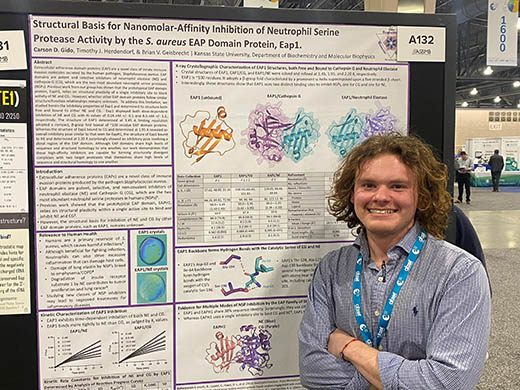K-State biochemistry student presents cancer research at national meeting
Thursday, April 7, 2022

Kansas State University undergraduate Carson Gido at the annual meeting of the American Society for Biochemistry and Molecular Biology in Philadelphia. Gido was selected to present his cancer research at the meeting. | Download this photo.
MANHATTAN — A Kansas State University student has presented his cancer research at a national meeting attended by some of the most respected scientists in his field.
Carson Gido, junior in biochemistry and molecular biophysics, Manhattan, gave the poster presentation "Structural Basis for Nanomolar-Affinity Inhibition of Neutrophil Serine Protease Activity by the S. aureus EAP Domain Protein, Eap1" at the American Society for Biochemistry and Molecular Biology Annual Meeting April 2-5 in Philadelphia.
Gido also was selected to present his research at Undergraduate Research Days. The virtual event, in early March, showcased some of the best undergraduate research being conducted at four-year public universities in Kansas.
"It felt good to be selected," Gido said. "I had been looking for an opportunity to share what we do."
Gido works with Brian Geisbrecht, professor of biochemistry and molecular biophysics, studying a white blood cell enzyme that, when over-activated, can cause lung cancer and other lung diseases.
According to Gido, the enzyme, called neutrophil elastase, can be inhibited, or blocked, by a molecule produced by the bacterium Staphylococcus aureus. The bacterial molecule, called Eap1, binds to neutrophil elastase. The research team has solved the structure of the molecules bound to one another.
"The molecules are sub-microscopic and therefore difficult to see and study," Gido said. "So, we use a technique called X-ray crystallography, where we isolate them, form them into a crystal and then do experiments that determine their structure and how they interact with each other."
Gido said the researchers hope their work will inspire ideas for designing a drug that inhibits neutrophil elastase and reduces tumor proliferation.
Gido's research experience and travel to the meeting were supported by the university's Johnson Cancer Research Center. Gido is the recipient of an Undergraduate Cancer Research Award from the center.
"I'm really grateful for the center's support," Gido said. "The meeting was such a great experience for me. In addition to presenting the research I've worked hard on, I got to network with well-known scientists and see other research presentations and what other students around the country are doing."
Gido plans to do a laboratory internship in the fall and graduate from K-State in spring 2023. Beyond that, he wants to earn a doctoral degree, possibly in biochemistry or molecular engineering, and lead a laboratory someday.
The Johnson Cancer Research Center supports and advances cancer research at Kansas State University. The center's Undergraduate Cancer Research Award program provides faculty-mentored research training and monetary support. Its award programs are funded through private donations.
